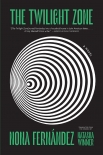The Twilight Zone Nona Fernández (e book reader for pc .TXT) 📖

- Author: Nona Fernández
Book online «The Twilight Zone Nona Fernández (e book reader for pc .TXT) 📖». Author Nona Fernández
I suppose that’s who we were: our children.
My school was a strange one, part public and part private. It started as a private school for young ladies in 1914, where the then-distinguished residents of Barrio Matta, in the heart of Santiago, sent their daughters to study with the nuns. The school had a big yard with a statue of the Virgen del Carmen in a grotto. Behind the Virgen, a long fence ran across the whole yard. On the other side of the fence was a public school attended by the not-so-distinguished residents of the neighborhood. These less well-to-do neighbors around the intersection of Nataniel Cox and Victoria sent growing numbers of children to the public school, and, across the fence, the stuck-up young ladies prayed to the Virgen, who was completely unaware that there were other children behind her back.
It was a time of fences, and virgins too.
But in the eighties everything changed. The Ministry of Education came up with the idea of decentralizing oversight of private and public schools, leaving it to the municipalities. On top of issuing business licenses and traffic permits, on top of worrying about garbage trucks, maintenance and decoration of public plazas, repair of potholes, regulation of street markets and a thousand other things, municipalities were charged with a new responsibility: education. A state subsidy was allocated, to be administered by the municipalities. No distinction was made between private and public education, thus creating two types of subsidized institutions: municipal schools, run by the district where each was located, and subsidized private schools, run by private entities. Each school was allotted a certain amount of money per student to aid in their education. So my school took down the fence in the courtyard, the students were mixed, and the school became a subsidized private institution. There was no divide anymore. We were all equal in the eyes of the state, and each of us would bring in a small sum to cover the cost of our education. It had been a while since the neighborhood stopped being distinguished, and there were no wealthy neighbors anymore who could pay the registration fee and tuition, so it made sense to accept this new form of assistance. As a result, classes grew to almost forty-five students and we ourselves didn’t know everyone in the room. A sea of children, all in uniform, we clung to our numbers and our last names in order not to be shipwrecked.
I don’t know whether González arrived before or after this metamorphosis. Hard to remember all the faces, all the names. There’s a photograph I’ve kept, proof of her presence back then. In it, we must be about ten, and we’re standing side by side, with the whole class. González is dressed as a ship’s mate, same as me. We’re wearing little white sailor hats that say Chilean Navy and we have mustaches that were painted on with burnt cork. We look alike, all forty-five of us, in blue uniforms with sailor hats and charcoal mustaches. We’re on a stage decorated with colored paper to look like a big ship, and in the middle of our group, Muñoz, black cork beard and sword in hand, gives a heroic speech. “Gentlemen, we are outmatched,” says our captain and we gaze at him with patriotic eyes. “But be brave and take heart. Our flag has never fallen in the face of the enemy and I hope that this day will be no different. While I live, the flag will fly, and if I die, my officers know their duty. Long live Chile, damn it,” and Muñoz sets out to board the enemy ship. Every year, on the twenty-first of May, we put on this performance. Like déjà vu, it’s up to us to die yet again on the enemy deck for our nation and our honor. Like last year, and the year before, and the year before that.
Let me interrupt my own reverie.
I should make a connection here to the man who tortured people. Follow the rule that I set for myself and uncover the strange, twisted link between him and González, a link close or far in a long, heavy chain like the kind dragged by Dickens’s ghosts or prisoners at a secret jail. But I won’t. I’ll focus on other parts of the screen. I’ll extend the borders of the twilight zone and I’ll go right on with this story of little soldiers and big charcoal mustaches of burnt cork.
González was quiet. She didn’t talk much, or if she did I don’t remember. She sat at the back of the classroom, half-hidden, writing letters on graph paper from her math notebook, passing them later to my friend Maldonado. They wrote to each other and told each other secret, important things in those letters. Like about González’s father’s accident. Her father was an officer and a gentleman in the service of our nation. No one knew him very well; he never came to school festivals, weekly Mass, or parent meetings, but a few people had gotten a glimpse of him and they said he was a big man with gray hair, quiet like González. The accident was at work. Another officer happened to pick up a grenade, and somehow the pin got pulled. To save the officer’s





Comments (0)